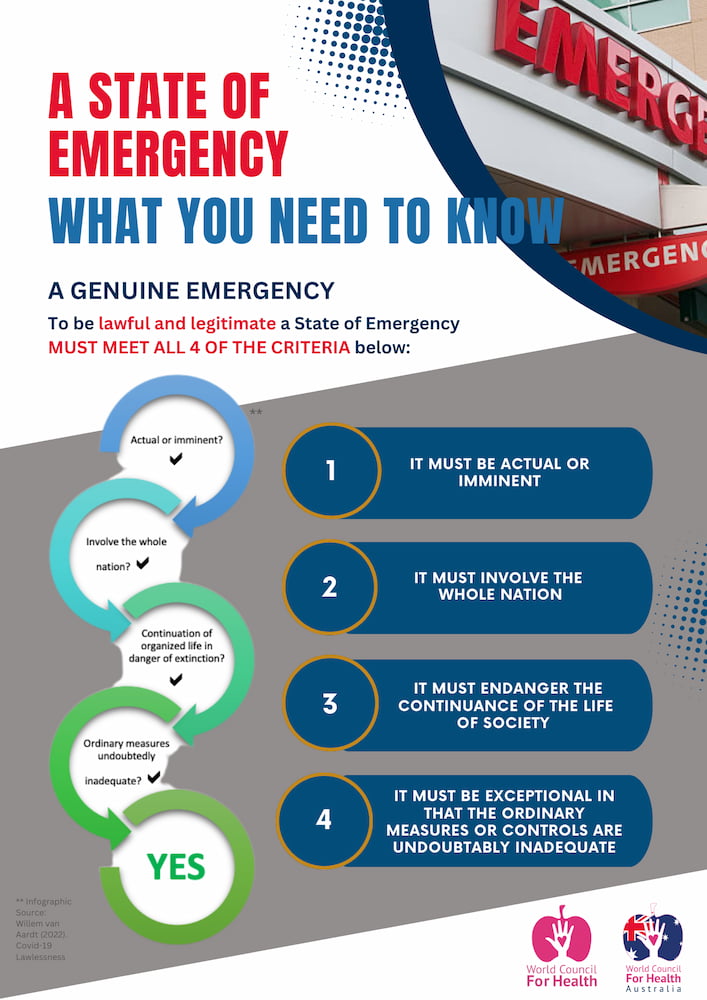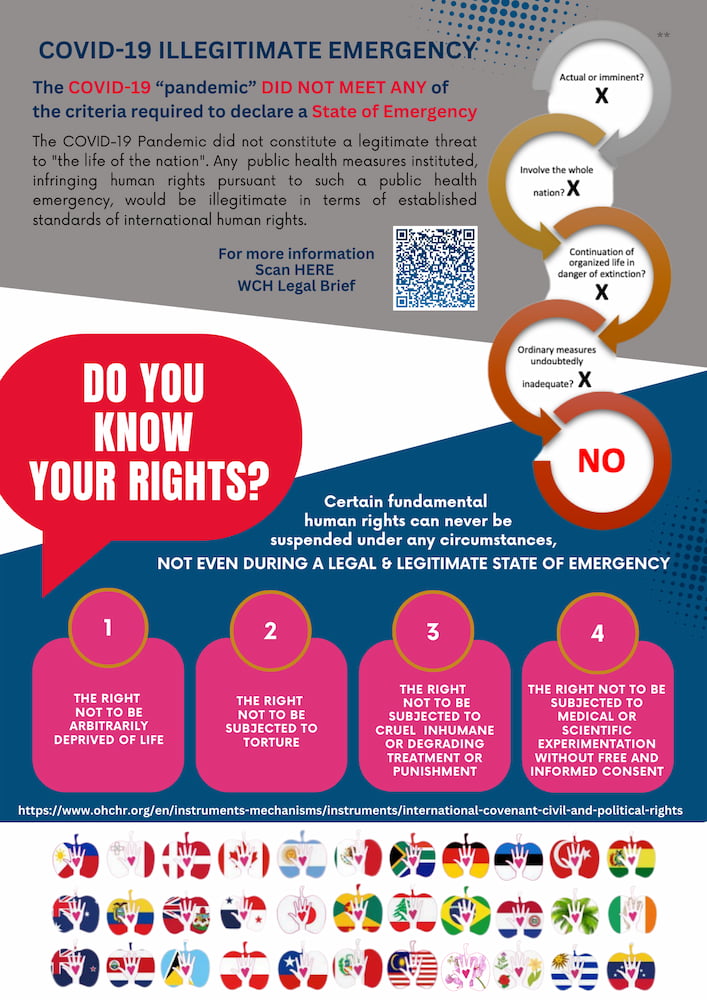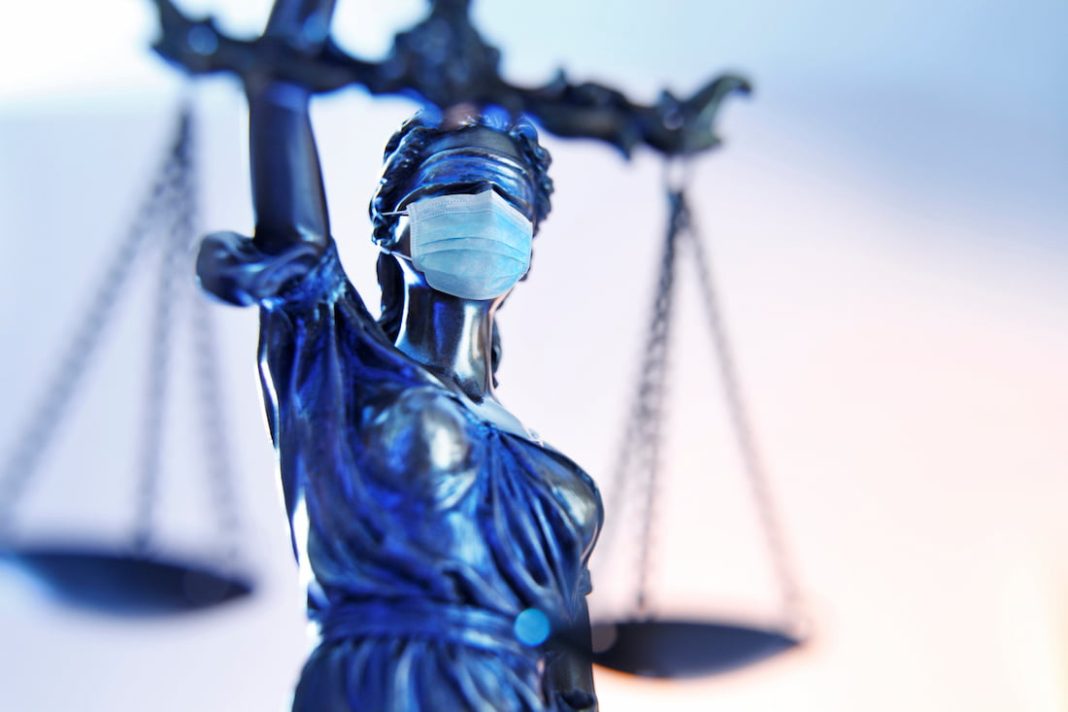Written by: World Council for Health Australia
During the COVID-19 pandemic, governments worldwide chose to suspend fundamental human rights under the guise of protecting public health. These decisions were not forced upon them by necessity, but were made unlawfully, without meeting the legal criteria required for declaring a State of Emergency. Measures such as lockdowns, mask mandates, school closures, travel restrictions, and vaccine mandates infringed on our basic freedoms and these actions were clear violations of International Human Rights law.
It’s time to understand how these breaches occurred, why they were unlawful, and how we can prevent similar abuses in future public health crises.
The four criteria for a lawful and legitimate state of emergency
A “State of Emergency” allows governments to temporarily suspend certain rights to protect public safety or national security, but this power is tightly regulated under international law. The United Nations’ International Covenant on Civil and Political Rights (ICCPR) outlines the following four criteria for a state of emergency to be considered lawful and legitimate:
- 1. Imminent Threat: There must be a genuine, imminent, and extraordinary threat to the nation’s survival—such as a natural disaster, armed conflict, or a large-scale public health crisis.
- 2. Necessity: The suspension of rights must be necessary to address the threat. In other words, the actions taken must be proportionate to the severity of the emergency and the specific goals they aim to achieve.
- 3. Non-Discrimination: The measures must apply equally to all people and must not target specific groups unfairly.
4. Temporariness: The suspension of rights must be temporary, limited to the duration of the emergency, and subject to regular review to ensure it remains appropriate.

COVID-19 did not meet these criteria
COVID-19 unequivocally failed to meet any of the four legal criteria required under international human rights law (IHRL) to justify the declaration of a State of Emergency.
First, the pandemic did not present a threat to the life of the nation, as healthcare systems, despite initial concerns, were never overwhelmed, and temporary emergency facilities were often underutilised. Second, while there was a fear of ICU capacity being exceeded, this concern was based on projections rather than actual capacity crises, which could have been addressed through ordinary measures, such as increasing hospital capacity or reallocating resources, as demonstrated in various countries.
Second, COVID-19 did not cause any significant disruption to the functioning of society. Life expectancy, mortality rates, were not negatively affected by the pandemic.
Third, the pandemic was not exceptional in a way that justified the suspension of fundamental rights. Standard public health measures—such as protecting vulnerable populations and expanding healthcare capacity—were more than adequate to manage the crisis. Therefore, the sweeping emergency measures imposed, including lockdowns, business closures, and travel restrictions, were not only unnecessary, but also illegal under IHRL, as they lacked any legitimate basis.
COVID-19 did not meet any threshold for a legitimate State of Emergency, and the subsequent violations of human rights that occurred worldwide were unjustifiable. These actions were not rooted in any true public health crisis, but rather in a politicised abuse of emergency powers that should never have happened.
Your inalienable human rights cannot be suspended
Even during a state of emergency, it is critical to remember that certain human rights are inalienable and cannot be suspended under any circumstances. These include:
- The right to life and physical integrity
- The right not to be subjected to torture
- The right not to be subjected to cruel, inhumane or degrading treatment or punishment
- The right not to be subjected to medical or scientific experimentation without free and informed consent
These fundamental rights are enshrined in documents like the Universal Declaration of Human Rights (UDHR) and the International Covenant on Civil and Political Rights (ICCPR). According to these instruments, governments may not violate these rights, even in the face of a crisis. For instance, Article 4 of the ICCPR explicitly prohibits the suspension of rights such as the right to life, freedom from torture, and freedom from slavery—even during a state of emergency. Governments cannot justify blanket actions like forced quarantines or vaccine mandates without a clear, proportionate, and justified reason.

What you can do: Educating yourself and protecting your rights
The World Council for Health has written extensively on this issue, highlighting the risks of misusing states of emergency to infringe upon human rights. Their Legal Brief on Preventing Abuse in States of Emergency provides a detailed look at how the rights of individuals must be protected even during extraordinary times.
Key takeaways:
- Governments are bound by international human rights law and must meet specific criteria to declare a state of emergency—criteria that COVID-19 did not meet.
- Your inalienable rights—such as the right to life, freedom from torture, inhumane treatment and freedom from being subjected to medical or scientific experimentation—cannot be suspended, even in times of crisis.
- The measures taken during COVID-19 were not legally justified, as the pandemic did not meet the criteria for a legitimate state of emergency.
- Understanding your rights is the only way to protect them.
For further reading on the legal aspects of human rights during public health emergencies, check out the World Council for Health’s Legal Brief.



